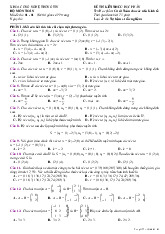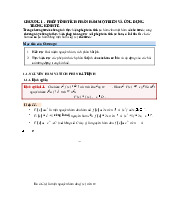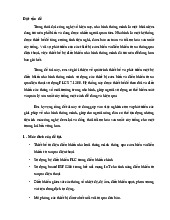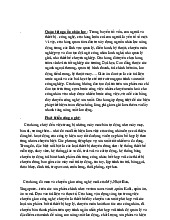








Preview text:
lOMoAR cPSD| 47708777
See discussions, stats, and author profiles for this publication at: https://www.researchgate.net/publication/347444440
IMPACT OF DIGITAL MEDIA ON SOCIETY Introduction Article · May 2020 CITATIONS READS 46 62,033 1 author : Abraham Das Kristu Jayanti College
2 PUBLICATIONS 46 CITATIONS SEE PROFILE
www.ijcrt.org © 2020 IJCRT | Volume 8, Issue 5 May 2020 | ISSN: 2320- lOMoAR cPSD| 47708777 28820
All content following this page was uploaded by Abraham Das on 18 December 2020.
The user has requested enhancement of the downloaded file.
IMPACT OF DIGITAL MEDIA ON SOCIETY Prof.Abraham,
Department of Journalism and Mass communication Kristu Jayanti College, Bangalore-77 Abstract:
Digital media refers to the media that are encoded in machine readable formats. Digital media is one
which can be created, viewed, modified, communicated, preserved on digital electronics devise
which include software, digital videos, images, web pages, databases, digital audio and E books.
Digital media is opposite to print media and other traditional or analog media. This paper is attempted
to trace the impact of digital media on society in its various forms. The course of research traces the
impact of digital revolution, the distinctive feature, and pros and cons of digital media on society.
The paper is an attempt to point out the merits and demerits of digital media and its impact on society.
Key words: Digital media, Digital revolution, Internet, web pages, social disconnect
IJCRT2005354 International Journal of Creative Research Thoughts (IJCRT) Downloaded by Anh Tr?n (trananh1307@gmail.com) www.ijcrt.org 2742
www.ijcrt.org © 2020 IJCRT | Volume 8, Issue 5 May 2020 | ISSN: 2320- lOMoAR cPSD| 47708777 28820 Introduction:
“The power of Digital media is that it forces necessary change”
Digital media refers to the media that are encoded in machine-readable formats. Digital media can be
created, viewed, communicated, modified and preserved on digital electronics devices such as
software’s, digital images, videos, web pages, websites, social media, digital data, digital audio and E books.
Digital media’s significant impact on society and culture is broader and complex. Digital media
combined with internet and personal computing has caused innovation in publishing, journalism,
public relations, entertainment, education, commerce and politics. New challenges of digital media
are revolving round to copyright, intellectual property laws and its legality. The so called
“Information age” aiming at paperless society also resulted in censorship doubts, digital divide,
digital Dark Age in which older media becomes outdated to the new or upgraded information system.
Digital media is digitized content that can be transmitted over the internet or computer networks. This
can include text, audio, video, and graphics. This means that news from a TV network, newspaper,
magazine, etc. that is presented on a Web site or blog can fall into this category. Most digital media
are based on translating analog data into digital data. The Internet began to grow when text was put
onto the Internet instead of stored on papers as it was previously. Soon after text was put onto
computers images followed, then came audio and video onto the Internet. Digital media has come a
long way in the few short years to become as we know it today and it continues to grow.
IJCRT2005354 International Journal of Creative Research Thoughts (IJCRT) Downloaded by Anh Tr?n (trananh1307@gmail.com)
The Birth of Digital Media www.ijcrt.org 2743
www.ijcrt.org © 2020 IJCRT | Volume 8, Issue 5 May 2020 | ISSN: 2320- lOMoAR cPSD| 47708777 28820
In earlier times, messages were once distributed by one particular source to their audience. The
audience gathered their sources through a certain form of distribution, whether it was newspapers,
magazines, radio, or television. Publishers had a great source of power over the information
distributed and how it was perceived by the public. However, all that began drastically change with
the rise of computers and more importantly the Internet.
Internet and Computers in Digital Media
Calculation and programming served as the main purposes for earlier computers. However, over time
computers began to play a more personal role in humans’ lives. No longer were computers being
associated with governments or large corporations. As technology grew, people found out that storing
information on a computer was convenient and provided good structure. People expanded the
functions a computer could provide to its owner. People began to use computers for communication,
creative purposes, research, and entertainment.
The Internet is a vast global system that links computer networks. People began taking to the Internet
for government, commercial, educational, social, etc. purposes giving rise to digital media. By being
able to connect with this growing amount of information, people were able to hear from multiple
sources and to make it more personal by posting their own views’. Now publishing and blogging has
become so easy that millions of people are able to post onto the internet creating a large amount of
websites and information. As new people join the Internet, the amount of information viewed and provided expands.
Digital media’s Impact: The digital media’s impact can be viewed from a broader perspective
namely the positive perspective and the negative perspective.
The Positive perspectives include the following:
Digital revolution: Digital media and digital revolution are two sides of the same coin. The
revolution is seen in the form of usage of modern technology. Personal computers, smartphones helps
anybody to access, modify, store and share digital media. Many electronic devices from digital
cameras to drones help in creating, transmitting and viewing digital media content. Combined with
the World Wide Web and the Internet, digital media has transformed 21st century society in a way
IJCRT2005354 International Journal of Creative Research Thoughts (IJCRT) Downloaded by Anh Tr?n (trananh1307@gmail.com)
that is frequently compared to the cultural, economic and social impact of the printing press. The www.ijcrt.org 2744
www.ijcrt.org © 2020 IJCRT | Volume 8, Issue 5 May 2020 | ISSN: 2320- lOMoAR cPSD| 47708777 28820
change has been so rapid and so widespread that it has launched an economic transition from an
industrial economy to an information-based economy, creating a new period in human history known
as the Information Age or the revolution. The transition has resulted in uncertainty about definitions
where the words like digital media, new media, multimedia and similar terms have a relationship to
both the engineering innovations and cultural impact of digital media.
The impact of the digital revolution can also be assessed by exploring the amount of worldwide
mobile smart device users. The fact that a large proportion of the world's population own smart
devices demonstrates the rapid level of growth achieved throughout the digital revolution. A
smartphone user is impacted with digital advertising every second they open their Apple or Android
device. This further evidences the digital revolution and the impact of revolution.
Innovative creation: Digital media has also allowed individuals to be much more active in content
creation. Anyone with access to computers and the Internet can participate in social media and
contribute their own writing, art, videos, photography and commentary to the Internet, as well as conduct business online.
The dramatic reduction in the costs required to create and share content have led to a democratization
of content creation as well as the creation of new types of content, like blogs, memes and video
essays. Some of these activities have also been labelled citizen journalism. This spike in user created
content is due to the development of the internet as well as the way in which users interact with media
today. The release of technologies such mobile devices allow for easier and quicker access to all
things media. Many media production tools that were once only available to a few are now free and easy to use.
Web only news: Internet helped the companies to distribute content easily. Newspapers are unable
to compete with the speed that digital news releases their stories. Not only can the latest updates
immediately be found online, but one can also view various articles to gain a better understanding
and survey multiple points of view.
Not only has the Internet allowed consumers to contribute to the news, they are also allowing them
to personalize their news experience. A costumer does not have to buy a whole newspaper to read
the select number of articles that interest them. Now they can go online and skip the other articles and skip the payment
Closer world: The rise of digital media has also allowed people to communicate with others all over
IJCRT2005354 International Journal of Creative Research Thoughts (IJCRT) Downloaded by Anh Tr?n (trananh1307@gmail.com)
the world. Digital media has increased globalization by making communication with people from www.ijcrt.org 2745
www.ijcrt.org © 2020 IJCRT | Volume 8, Issue 5 May 2020 | ISSN: 2320- lOMoAR cPSD| 47708777 28820
other parts of the world very easy. Video games can be played over the Internet with people from all over the world.
Digital media has eliminated many cultural boundaries and will continue to do so as other less
developed countries begin to become more reliant on technology. Digital media has provided instant
communication between people all over the world. Different forms of digital media make this
interaction easy and fun. Technology and the sharing of photographs on the Internet have found ways
past language barriers. Thanks to digital media we are now entering a world that is culturally globalized.
Books began appearing on the Internet for free. Writer’s now have the option of placing their books
online to be purchased or read through e-books. E-books are an electronic version of a printed book.
Although the device to read the print may cost a lot more than the book itself, ordering more electric
texts can be cheaper. It can be a lot more convenient than buying or borrowing a book. Ebooks also
have the ability to translate text to other languages that the book is not published in.
Digital media has changed the flow of the entertainment industry permanently. With the rise of digital
media, more and more people in the entertainment industry realize the importance of the Internet.
Websites are made to advertise the show. A website may contain celebrity biographies, photo galleries, blogs, etc.
Positive empowerment: Digital media empowers one to assess how technological change is linked
to forces of globalization, political institutions, and historical developments, and how it affects
democracy and social change. It also equips one with a thorough theoretical and methodological
grounding in media and communication studies. Furthermore it enables one to apply up-to-date
research skills to carry out research in various fields. Digital media results in productivity of reflective
and well- trained graduates who can understand the multiplicity of social, cultural, political and
technological complexities of digital media and who in the long run will be able to solve complex
problems and can help in taking vital decisions which are rational in character.
Modernized living style: Digital technology has transformed modern life with gadgets such as
laptops, tablets, and smartphones now commonly owned. As well as bringing benefits, digital
technology has also bought many downsides. | Source
Digital technology has revolutionized almost every aspect of people's lives in recent decades. Office
IJCRT2005354 International Journal of Creative Research Thoughts (IJCRT) Downloaded by Anh Tr?n (trananh1307@gmail.com)
work, shopping, music, movies, television, photography, travel, transport, and long distance www.ijcrt.org 2746
www.ijcrt.org © 2020 IJCRT | Volume 8, Issue 5 May 2020 | ISSN: 2320- lOMoAR cPSD| 47708777 28820
communications are just some areas that have been transformed. It's become increasingly rare to find
an electronic device or large machine that doesn't incorporate digital technology in some way.
Digital technology means that devices can be smaller, lighter, faster, and more versatile. It means that
huge amounts of information can be stored locally or remotely and moved from place to place almost
instantaneously. Even the term "information" has expanded to include photos, audio, video, and other
media, rather than just letters and numbers. The information can be much more easily manipulated
too; photos, music, and movies can be edited, for instance.
The negative perspectives and the impact of digital media on society include the following:
Safety of the digital data security: Since, vast amount of data are collected and stored in digital
technology which includes private information of individuals and Organisations, it may be difficult
to keep the collected data safe. There are possibilities of the private information’s reaching hard core
criminals. It's become much harder to have personal privacy in the digital world and that's on top of
the dangers of your personal data being stolen or sold. Digital cameras watch and record our
movements in public places. Minor indiscretions can now haunt an individual for life when they're
posted on the internet. Controlling your personal information is very difficult and sometimes
impossible. Moreover Digital media can be difficult to store and maintain for a long term. File
formats change over time. In some instances traditional media can last longer than their digital equivalent.
Complexity: Understanding the devices and machines means depending on computer. Today, using
any technology of digital media implies tackling all sorts of complicated settings. A minor error in
technology can cost both time and expense. Moreover it results in overburden of work. Many modern
workers spend their days trying to keep up with the hundreds of emails that they are sent each week,
all of which require reading and some of which require replies or action. Texts from colleagues in
the evenings or on the weekend can mean that people never fully escape work. Organizing the vast
amount of digital data acquired in some jobs, such as minutes of meetings, training videos,
photographs, and reports can involve a high complexity of work style.
Social disconnect: There is an increasing tendency for people to socialize and communicate via
digital devices rather than through real life contact. This can easily lead to a sense of disconnect and
isolation. Human beings have evolved over thousands of years to have real contact, taking that away
IJCRT2005354 International Journal of Creative Research Thoughts (IJCRT) Downloaded by Anh Tr?n (trananh1307@gmail.com)
is a bad idea. Studies have suggested that the lack of real life contact is causing depression and other www.ijcrt.org 2747
www.ijcrt.org © 2020 IJCRT | Volume 8, Issue 5 May 2020 | ISSN: 2320- lOMoAR cPSD| 47708777 28820
forms of mental illness in many people. Even in a family, one can see communication through digital
media, rather than direct communication. Society continues to become more and more depersonalized
as digitized machines replace humans. People shop online, do their banking online, pay bills online,
and increasingly work online. Transport is also set to become automated, which will result in taxis
and delivery vehicles being driver free.
Insecurity of Jobs: It used to be that you had to be physically present at a workplace to do a job, but
now many work tasks are performed remotely via the internet. That means a Third World worker in
a low wage economy can undercut you and take your job. Increasingly, humans aren't needed at all
for many tasks, as computers gradually replace them. Driving jobs, for instance, will disappear soon
as vehicles become self-driven.
Crimes: The internet is fertile territory for negative forces to operate, thanks to its international
nature, large scale, and the relative anonymity that users can enjoy. Examples of this include:
terrorists using social media to promote themselves and encourage others; drug dealers using the dark
web to trade; pedophiles using chat rooms and other places to exchange photos, videos and other
information; and authoritarian regimes attempting to sway or distort elections in democratic countries etc.
Digital media manipulation: Digital media such as photographs, audio, and video are easy to edit,
making the manipulation of media widespread. It's not always easy to tell what is real and what is
fake anymore. Photographs can be altered using editing tools such as Photoshop. Digital audio and
video can be doctored. Thus digital media manipulation can result in negative things- online bullying,
work stress, emotional blackmail and other possible crimes.
Impact of plagiarism and copyright and masked identities: Since digital media is remarkably easy
to copy and reproduce, there are more chances of plagiarism and copyright thus raising the question
on copyright laws. Digital technology provides wide scope for users to hide their identities. Studies
show that people are much more likely to behave anti-socially if they don't think that there will be
any consequences. Bullying, trolling, stalking, threatening, and insulting behavior have all increased
dramatically with the rise of the internet. People assume fake personas for the purposes of scamming
and defrauding. Pedophiles use fake personas to gain access and befriend children.
Addiction: Social media, computer games, messaging, and dating websites can all be addictive. IJCRT Gam 20 es 05 w 35 an 4 t Int yo er u n t atio o p n l al ay Jou so rtn hal at o f y C o r uea t wiv il e Re l bu se y a t r hch T e n ho ex u t g vh ets (IJCRT rsion. ) W Dow eb n s loa it de es d b wy An anth Tr y ? o n u( trtan o a n i h n 1t307@g eractm a s il. o c o t m) hat www.ijcrt.org 2748
www.ijcrt.org © 2020 IJCRT | Volume 8, Issue 5 May 2020 | ISSN: 2320- lOMoAR cPSD| 47708777 28820
they can bring in advertising money. Users end up wasting vast amounts of time and money.
Moreover most of the digital gadgets typically have a short lifespan and as technology advances at a
fast pace, devices and machines quickly become unusable thus inducing people to get addicted to go
for the new invented model resulting in more budget. Conclusion:
Though digital media has both positive and negative impacts on society, yet one should realize its
importance in the present world. Everyone should be ready to follow this principle – “Don’t use
digital media to impress people, but use it to impact people in a positive way References:
Adrian- Digital media and society.
Andrew white- Digital media and society.
Charles- Digital media and Ethics Grant- Digital cultures.
Handbook of research on social media. Mark-
Media, society and you
Nancy- Personal connections in the digital world
Nick Couldray-Media, society and world
Simon- Digital media and society
Tony Feldman-Introduction to digital media.
UCL press- How the world changed WWW and Scholarly articles. View publication stats
IJCRT2005354 International Journal of Creative Research Thoughts (IJCRT) Downloaded by Anh Tr?n (trananh1307@gmail.com) www.ijcrt.org 2749




